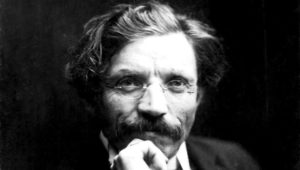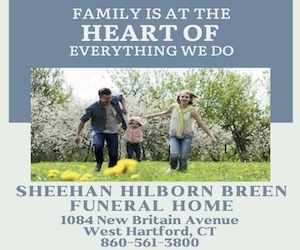Upper Fairfield County Jewish Federation launches a year-long exploration, “Common Threads: Connecting Ancestry to Community”
By Cindy Mindell
BRIDGEPORT – The 15 communities of the geographic area best described as “upper Fairfield County” reflect an American-Jewish tapestry that has been stitched together over the past 300 years by immigrants as diverse as the world itself. And while Jewish identity may be a unique personal expression that varies from individual to individual or family to family, there are also many commonalities that define Jewish life and community.
This month, the Federation for Jewish Philanthropy of Upper Fairfield County (the Federation) launches Common Threads: Connecting Ancestry to Community, a year-long celebration of those shared experiences and elements that serve to weave together an integrated Jewish community.
From September through May, a wide range of educational and cultural events hosted by congregations and organizations throughout Upper Fairfield County will offer a deep-dive exploration into the Jewish community’s diverse ancestry and heritage.
The idea is the brainchild of David Weisberg, Federation CEO since June 2016, who was inspired by Margery Verlezza, program director of the Bridgeport-based Merkaz Community High School for Judaic Studies. Verlezza had participated in a program at Congregation B’nai Israel in Bridgeport, where congregants were offered the opportunity to have their DNA tested, with the results announced in a community reveal event. When Verlezza’s congregation, B’nai Torah in Trumbull, was planning the same type of program together with partner congregations Rodeph Sholom in Bridgeport and Beth El in Fairfield, she approached Weisberg for Federation support.
Weisberg agreed, with two caveats: the program needed to be open to the entire community, and the DNA-testing component had to be offered as an optional centerpiece to a larger framework, exploring diverse aspects of Jewish ancestry and heritage.
Verlezza had been impressed with Weisberg’s community-wide staged reading of Fiddler on the Roof, held last December at Congregation Rodeph Sholom in Bridgeport, complete with musical ensemble and chorus. “I told David, ‘Fiddler was so fabulous; what could you possibly do to top it and get everybody involved?’” she says.
The answer: Common Threads, a name cooked up by Merkaz head of school Shelley Kreiger.
“Our challenge is that this Federation is very much a community of communities and our sub-communities are the congregations,” Weisberg says. “We don’t have a Jewish Community Center here; there is no center to this circle we call ‘Upper Fairfield County’ either geographically or physically or symbolically. So, we’re really a web and we need to create connectivity between the congregations and not supplant what they’re already doing but figure out a way to lift up what they’re doing, to create some kind of whole that’s greater than the sum of its parts, to use a very worn expression. This idea provided an opportunity to create a year-long programmatic structure focusing on ancestry and heritage, and could create a platform for the entire community to work together.”
Weisberg then approached the leadership of each congregation in the catchment area, encouraging them to design and host a program over the coming year, related to ancestry and heritage.
“Each congregation can do something independently that’s part of the whole that we’re doing together, and Federation will provide value-added by promoting it, by making sure that there’s cross-pollination in who the audiences are, so that we can develop a sense of one community,” he says.
Weisberg also created a partnership with MyHeritage, an Israel-based global company that offers family-history research tools and DNA testing. Individuals may purchase DNA-testing kits, and the aggregated results will be used to create a virtual map of the Upper Fairfield County Jewish community ancestry that will be featured on the Federation’s website and in an exciting “reveal” event in April.
Although congregational affiliation is the way in which many area Jews create community, there are other, perhaps more transcendent, ways to weave the ties that bind.
“We don’t all connect only because of the congregation we belong to; we connect because of where our ancestors came from, what our traditions are, what our family recipes are,” Weisberg says. “Common Threads is a way to begin to create this kind of connectivity in our community. We also hope that it’s a way for us to begin to reach out to those who aren’t affiliated with a congregation but who feel a connection to their Jewish identity and their Jewish heritage.”
In addition to programming and DNA testing, Common Threads has a third interweaving strand, a blog for community-members to share their “ancestories” – family histories that serve to expand the sense of connection among readers and inspire others to tell their own stories.
As of this writing, Common Threads partners include 23 community organizations and Jewish congregations and agencies throughout Upper Fairfield County.
This kind of collaboration is the result of Weisberg’s unique approach to his role.
“I reject the old model of the Federation being an umbrella that’s over everybody,” he says. “I think the Federation needs to be playing a role as a connector, bringing people together and raising up organizations – not seeing itself as being above, but providing a foundation that raises the community up, and that’s what we’re trying to do here.”
So far, the program schedule includes a community read of The Weight of Ink with a visit by author Rachel Kadish, lectures, workshops, musical events, and film screenings, culminating in the Federation’s third annual Southern Connecticut Jewish Food Festival in May. All Common Threads programs are open to the entire community.
Common Threads kicks off on Thursday evening, Sept. 27 with a screening of Iom Romì, a 2017 documentary chronicling a day in the life of the Jewish community of Rome, followed by a talkback with the director and producer-cinematographer.
“The Federation and its many partners hope that this exciting programming framework will create the opportunity for a year of discovery – about ourselves, about our rich history, about our diversity – and, importantly, about the common threads that weave the fabric of our vibrant community together,” says Weisberg. “We are excited to learn about all the connections that exist within our vast community, and how these intersections enrich our understanding of who we are as a Jewish community.”
For a full Common Threads program schedule, blog, partner list, and ordering information for MyHeritage DNA testing kits, visit shalomct.org/commonthreads.
CAP: “Common Threads” will kickoff on Sept. 26 with a screening of the film “Iom Romi,” a documentary chronicling a day in the life of the contemporary Jewish community of Rome, which for centuries has lived in limbo between persecution and integration. A talk-back with the director and producer will follow.
From the Common Threads Blog: Sholom Aleichem Remembered
By Sandra Waife Rothenberg
To the world, he is the celebrated Jewish writer and humorist; to me, my great-grandfather. Although I did not know him personally, he left a legacy of laughter that we continue to celebrate and learn from.
My father’s mother, Marie Waife Goldberg, was the youngest daughter of Sholom Aleichem. She passed down to my generation and those that follow the life story of the greatest figure in Yiddish literature in her book, My Father, Sholom Aleichem.
My grandmother told me she remembered her father standing up while he wrote at a pulpit he designed himself. It was tall enough for him to rest his elbows with a place for a candlestick on top. He would stand there for hours, never disturbed when the children were playing. My grandmother told me that he loved children above all, and on each of his six children’s birthdays, he would take them for a walk in the country and give them “This mountain, those trees, and the flowers.” The birthday celebration, in Russian tradition, would last for a week.
Sholom Aleichem’s Last Will and Testament was read into the Congressional Record and is considered one of the great ethical wills in history. Sholom Aleichem asked to be remembered on the anniversary of his death with laughter: “Gather with my family and good friends and read this last will of mine and pick out a story – one of the very happiest.”
The yahrzeit tradition continues to be faithfully maintained by our family. Each year in May, we gather to read aloud his will and a few of his humorous stories in Yiddish and English. The event started as a family gathering and now includes friends and admirers. This year was the 102nd year of our remembrance.
“To make people laugh, to point out the ludicrous, was almost a sickness with me,” Sholom Aleichem wrote in his autobiography. To his children, he wrote, “Dear Beloved Children, to you I dedicate my work of works, my book of books, the song of songs of my soul. I realize that this book, just as any man’s handiwork, is not without defect. But who knows better than you what it has cost me! I have given to it of my best: my heart. Read it from time to time. Perhaps you or your children will learn something from it – to love our people and to appreciate their spiritual treasures, which lie scattered in all the dark corners of our great Exile, in this great world. This would be the best reward for my faithful, more than thirty years’ labor in our mother tongue and literature. Your father, the author, Sholom Aleichem.”
Sandra Waife Rothenberg is a Weston resident.








 Southern New England Jewish Ledger
Southern New England Jewish Ledger










